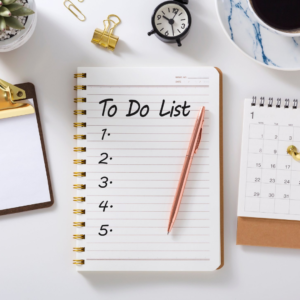Time management is a real struggle for a lot of people. Many of us get overwhelmed with tasks, to-do lists, and just generally keeping up with life. Being proactive with your time management will make your life easier, and much (much, much) less stressful.
Here are some tips on how to improve your time management. Time management is something I’m very good at, and all of these I’ve incorporated and used over the years.

1. Understand where your time is going – you can’t change anything without being aware of what you need to change. Once you understand where your time is going, only then can you change anything.
2. Be realistic – No matter what way we work it, there are only 24 hours in a day. We can’t make more. If you or someone you know (like your boss) is expecting you to keep getting more and more and more done each day, you need to be realistic. You can’t do everything. You can do some things, you might be able to do a lot of things, but I promise none of us can do everything. And the sooner we can accept that, the better we’ll be! And we’ll be less stressed about how we’re not getting everything done.
3. Prioritize – Once you’ve got a sense of where your time is going, next comes the step of figuring out what your priorities are. Most likely, the main priorities are going to be the things you a) love to do, and b) need to do to survive. Many people’s biggest priorities are family, work, and anything needed to keep those moving forward (like commuting). Take some time to write down these priorities to really make sure they’re clear in your mind.
4. Use to-do lists the right way – I love lists. Mostly because I love crossing things off of lists. But I do love lists. I make a lot of them, and I use them all the time. If you’re a list person, you’ll know what I mean.
The downside of lists, though, is that sometimes I randomly add a task to my list, with no end-date in sight. And that means that if I don’t feel like doing it, or it’s hard to do, it keeps getting pushed off the list.
The best way to use a to-do list is to combine it with a calendar or a timeline. Give each task a “complete by date” so you know which ones need to be a priority. Something that needs to be completed by tomorrow will have to take priority over something that needs to be done in 3 weeks’ time (usually).
5. Use a calendar – a calendar coupled with a to-do list can be an incredible tool. Physical calendars help people who are very visual get organized. Digital calendars are very helpful because you can set reminders in them. Most organized people I know use one or the other. You can try both out to see which one works better for you.

6. Do harder things early in the day – Things that take a lot of extra work tend to be easier to do early in the day. If you’re sitting down for a busy day at work, getting the hardest tasks done first will make your day easier as you go along. Your brain is ready for harder tasks early in the day, and it also makes the day a lot more enjoyable as you go (when you don’t have to face the harder things later in the day).
Also, getting the harder things out of the way first thing in the day will make it less likely that you procrastinate later. It’s much easier to procrastinate later in the day as we get tired and drained.
7. Schedule in rest (including sleep, breaks, mindfulness, etc.) – It doesn’t matter how busy you are and how many things you have to do today, you need to schedule in rest. Taking time away from your task, work, to-do list, etc. will not only let you rest your mind, but will actually make you more productive for the rest of the day.
If you prioritize even just a few minutes of rest throughout the day, you’ll feel better, your stress will be less, you’ll be more productive, AND you’ll be more creative! (This is scientifically proven…).
8. Have a morning routine – If you get up, in the morning with a clear routine, you’re setting yourself up for an amazing day. That routine needs to be set up by you! It does not need to be stimulating and 4 hours long. It does need to be something that’s going to engage you (both physically and mentally is ideal), sets your mindset for the day, and can be done consistently.
9. Have an evening routine – Just like a morning routine is going to set you up for the day, an evening routine is going to set you up for amazing sleep. Without an evening/sleep routine, you are less likely to get a good night’s sleep.
10. Remove the distractions – Distractions are a big thing when you’re trying to be productive. Some of these distractions are less controllable than others (kids interrupting your work time while they’re at home, for example). But some of them you can absolutely incorporate. Here are a few that have really worked for me:
Turn off all phone notifications. The only notifications on my phone are if someone calls me or I get a text. I don’t get email notifications, social media notifications, or any other app notifications to my phone. I have to look for them, which means I’m much more deliberate about how and when I do so.
If you’re working at your computer, shut down browsers that you either don’t need or that will distract you. Close your email browser if you’re not working on emails right now! Nothing bad will happen if you don’t see an email the minute it comes in. And you’ll be able to focus much better on what it is you are working on.
Modify your social media notifications. You can set most social media to notify you for just about anything. Turn all of these off, except the ones that are most important to you. That way when you log into Facebook, all you’ll see are the notifications that matter, not that your great aunt posted something in a family share group that hasn’t been active in 4 years.
These are 10 tips, of many, that might help you improve your time management. Good luck, and let me know how it goes!
